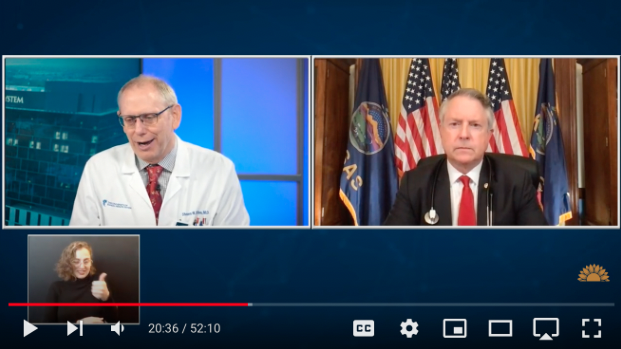ICYMI: Senator Marshall Joined KU Medical Centers’ Show Me The Science with Dr. Stites to discuss Antimicrobial Resistance
Washington, D.C. – U.S. Senator Roger Marshall, M.D. joined The University of Kansas Health System Show Me The Science podcast with host and KU Chief Medical Officer Dr. Steven Stites. The episode focuses on Senator Marshall’s work in Congress on the impacts of antimicrobial resistance, known as superbugs, that are unraveling modern medicine. In July, Senator Marshall chaired the Health, Education, Labor, and Pensions (HELP) Subcommittee hearing, Superbugs: The Impact of Antimicrobial Resistance on Modern Medicine.
On average, 3 million Americans this year alone will develop some type of an antimicrobial resistant ‘superbug’ to antibiotics. This growing silent epidemic impacts more than 2.8 million Americans each year and kills more than 35,000 people annually.Senator Marshall, an alumnus of the University of Kansas Medical School, was happy to join Dr. Stites and his co-host Dr. Dana Hawkinson, an infectious disease specialist in Kansas City, Kansas, to bring awareness to the complications the medical field is facing in treatment plans for patients.

You may click HERE or on the image above to watch Senator Marshall’s full interview.
Highlights from his remarks include:
On the rise of antimicrobial resistance and its impact on modern medicine:
“I think just for your listeners you know, think about Penicillin. It was developed in the 1920’s. It was very effective against gram positive organisms, like staph [infections] and strep [throat] but through the years it’s been used and bacteria are smart. They replicate at such a quick fashion that eventually they develop a resistance to that particular antibiotic.”
“So in my own practice one of the most common infections I saw was bladder infections and kidney infections. Those are both some of the leading causes of maternal morbidity and mortality as well as a cause of preterm labor.”
“What we saw in my 25-year practice delivering a baby almost every day is that, maybe starting off the bladder infections, kidney infections had 10% resistance to Ampicillin to the point where it’s probably 30% [today].”
“So 30% of those bladder kidney infections are resistant to Ampicillin. So fortunately we always stayed a step ahead and we had something else we could treat those folks with. I think the same thing can be said for like you said people with cystic fibrosis get recurrent lung infections pneumonias and for some reason pseudomonas develops a strong resistance.”
“Dr. Stites you said you know you’ve seen people die from a resistant bacteria before and that must just be grueling to sit there and watch someone slowly die, if you just had that medicine to cure them.”
On developing new drugs in this time of increased patient resistance:
“If you develop a new drug for diabetes or say for obesity, you know, the opportunity to prescribe that drug on a daily basis for tens of millions of patients, there’s certainly a large return on investment. Versus the medicines that you and I are talking about today, I’m hoping you don’t have to use them and if you do maybe you’ll use it for just for 7 or 10 days.”
On the University of Kansas’ work to solve this epidemic and the need for more important research:
“I’m so proud to work with KU Med Center. I’m counting on you all to help me find out what exactly we should be using through research projects because I know you’re not going just to do the research but you’re going to find out the best way to implement it as well.”
“I just so appreciate my alma mater. KU Med Center saved the life of my father and my brother in the past two years, and just so appreciative of what you’re doing out in Great Bend and across the state. A leader in research in so many ways Kansans can be proud of the University of Kansas. I’m just so proud of my alma mater.”
